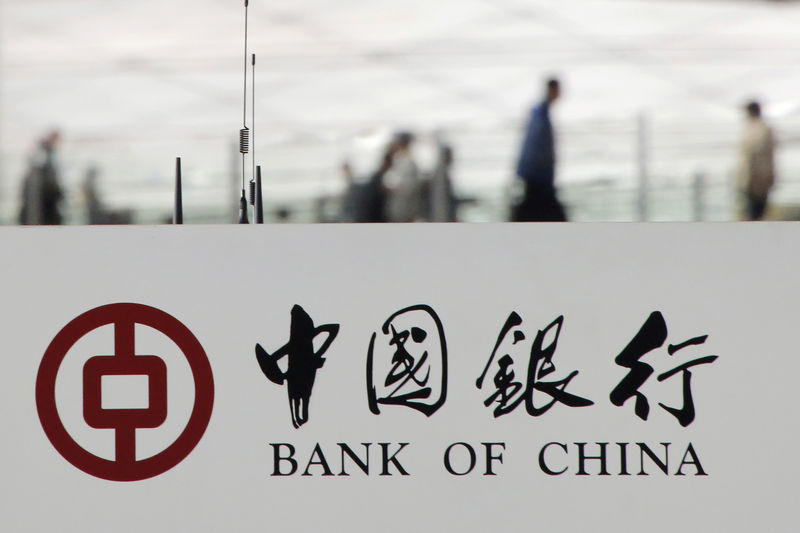By Shu Zhang and Samuel Shen
SINGAPORE/SHANGHAI (Reuters) - China took a big step last week on the long road toward recapitalization of banks hobbled by stale loans, giving a first ever approval for a perpetual bond issue by a lender, but going by initial feedback "perps" could be difficult to sell.
The role of pathbreaker has fallen to Bank of China (BoC) (SS:601988) (HK:3988), the country's fourth-largest lender. Last Thursday, the banking and insurance regulator gave BoC clearance to issue up to 40 billion yuan ($5.9 billion) of non-fixed term bonds.
How it fares will be scrutinized by every other bank in China.
Alarmed by a slowing economy, policymakers are in a hurry to have banks fit enough to ramp up credit expansion, but banks' lending capacity is largely limited by their capital adequacy.
Most Chinese lenders have relatively thin Additional Tier 1 (AT1) capital, and before approval was given for perps the only way that banks could raise AT1 capital was through the issuance of preference shares.
But with many listed banks now trading below their book values in a weak stock market, lenders find it challenging to sell additional shares and are increasingly looking to the onshore bond market to take advantage of current low yields.
CIB Research, a unit of Industrial Bank (SS:601166), estimated Chinese lenders need to raise 470 billion yuan ($69.24 billion) this year through perps and preference shares to cover a shortfall in Additional Tier 1 capital.
Investors would need a higher yield to compensate them for the higher risk, as perp holders have less claim than normal debt holders, and only slightly more claim than equity holders.
"Theoretically the risks of holding them are very high and the returns are limited," said Gu Weiyong, chief investment officer of UCON Investments, a private fund. "There are better investment options than that."
BoC declined to comment on its perp plans, and hasn't indicated what yield it would offer.
CIB estimated perpetual bonds could be priced 150 bps higher than Tier-2 capital instruments issued by the same bank, or around 7 percent for a mid-sized bank.
Three sources, including a banker and two institutional investor executives, told Reuters that BoC had already sounded out potential investors to gauge demand and possible pricing.
BoC is planning to issue the perpetual bonds by the end of January, one of the sources said, and they are likely be priced within the range of 4.5 percent to 5.2 percent.
"The yield isn't high enough to attract us," said the source who works at the asset management unit of a state insurer and attended the bank's roadshow.
Executives at a number of institutions said the investor base for the BoC issue could be limited, though the government could easily push state-owned funds and insurers to buy a large chunk of the debt.
Some fund and wealth managers say they are not attracted by perps, and it was also unclear whether regulators will loosen current restrictions that prevent insurance companies from purchasing capital instruments with unfavorable write-off provisions, like perps.
GREATER INVESTOR SCRUTINY
Though perps are widely used globally, China's banks could face greater cautiousness from investors, given an industry-wide acceleration of bad loan build-up following a credit boom since the global financial crisis in 2008.
Aside from the absence of a maturity date, which theoretically means issuers would never have to pay back the principal, and the disadvantageous write-off provisions, the structure of perps also exposes holders to high price fluctuations and unstable coupon payments.
"If a bank issuer gets into real trouble, the chance for bondholders to recover their investment is pretty low as banks are leveraged," said Ray Heung, a Hong Kong-based analyst at Moody's Investors Service.
Chinese banks' non-performing loan ratio, at 1.89 percent, is the highest since the global financial crisis, according to official data, but some analysts believe the ratio could be much higher as many banks are slow to recognize loans overdue or hide them in the "special mention loan" category.
The current 0.77 price-to-book ratio for listed banks implies a bad loan ratio of 12 percent, according to Chuancai Securities.
The International Monetary Fund has been urging Chinese banks to gradually increase capital to cushion them against a sudden cyclical economic downturn - a risk that loomed larger after data on Monday showed that during the fourth quarter of 2018 the economy grew at its weakest rate since the global financial crisis.
Beijing's multi-year campaign to crack down on financial risks and shadow banking activity has increased the urgency for banks to recapitalize as lenders now have to bring off-the-balance-sheet loans onto their balance sheets and set aside more capital buffers to provision against rising bad debt in a slowing economy.
Last year, Chinese banks announced hundreds of billions of yuan worth of private and public fundraising plans through the issuance of shares, led by Agricultural Bank of China's (HK:1288) (SS:601288) 100 billion yuan A-share private placement, the biggest by a listed Chinese commercial bank.
And in December, the Financial Stability and Development Committee (FSDC), a top-level government body, declared its hope that banks would start selling perps "as soon as possible".
The prospectus for the BoC perp, which is not public but has been seen by Reuters, lists BoC International (China) as the lead underwriter, China International Capital Corp as the joint lead, and HSBC Bank (China) (L:HSBA) and Bank of Jiangsu (SS:600919) as members of the underwriter syndicate.
The BoC issue looks set to be the first of many, with Harbin Bank (HK:6138) already looking to sell up to 15 billion yuan in perpetual bonds.
